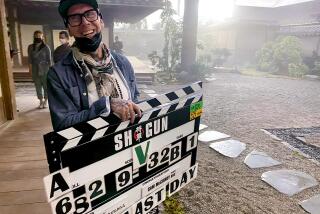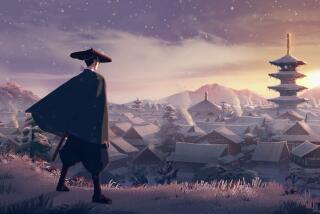Themes of obsession, trust and inner strength find expression in three animated films
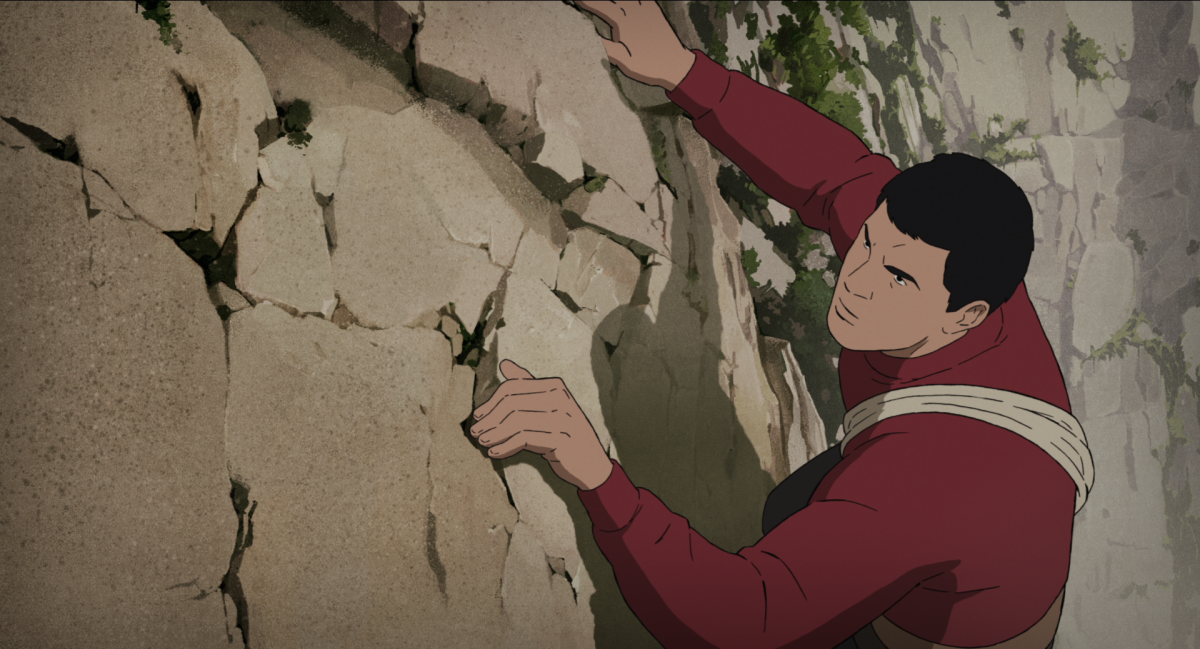
Three movies with international flavor — a French film about Japanese mountaineers, an American studio release set in a mythologized Southeast Asia and an anime from a Japanese master set largely in a virtual world — deserve long looks in the race for the 2022 animated feature Oscar.
The Summit of the Gods
It’s 2D, but “The Summit of the Gods” makes viewers feel its dizzying heights. The French film delves deeply into that drive to take on dangerous mountains, and does so by showing, not telling. It was something director Patrick Imbert investigated from the safety of his studio.
“I read a lot about mountaineers and they all talk about this mysterious thing that pushes them to do what they do. There are no words to put on it. I tried to compare it with the creative approach: If you ask me why I draw, I don’t have any answer to give you. I cannot live without doing it.
“I think it’s the same for these guys. The difference is that in drawing ... we can have tendonitis,” he says, laughing.
“Summit” is no joke. It’s a drama for grownups that begins with one mystery — a journalist learns of the existence of a camera that could settle, once and for all, who was first to summit Mt. Everest — then probes the deeper enigma inside the world’s greatest mountaineers. The journalist searches for the legendary Japanese climber who could hold the answers.
Imbert’s hand-drawn animation beautifully articulates the characters, giving each their own physical vocabulary and body language. Avoiding what he calls “animation effects” as much as possible — hallucinatory visuals that can unmoor the viewer from the reality of the film — he conveys the experience of climbing: the vertigo, the lethality.
By bypassing discussion for scenes of climbers pressing onward, and depicting one character first observing, then falling into the obsession, “Summit” reaches something perhaps profound: a visceral examination of that inexplicable drive. Even the plot’s quest appears a molehill beside it.
“I still don’t care who reached the summit first. I totally don’t care,” says Imbert. “It’s not a question about who reached it first. It’s something else.”
Raya and the Last Dragon
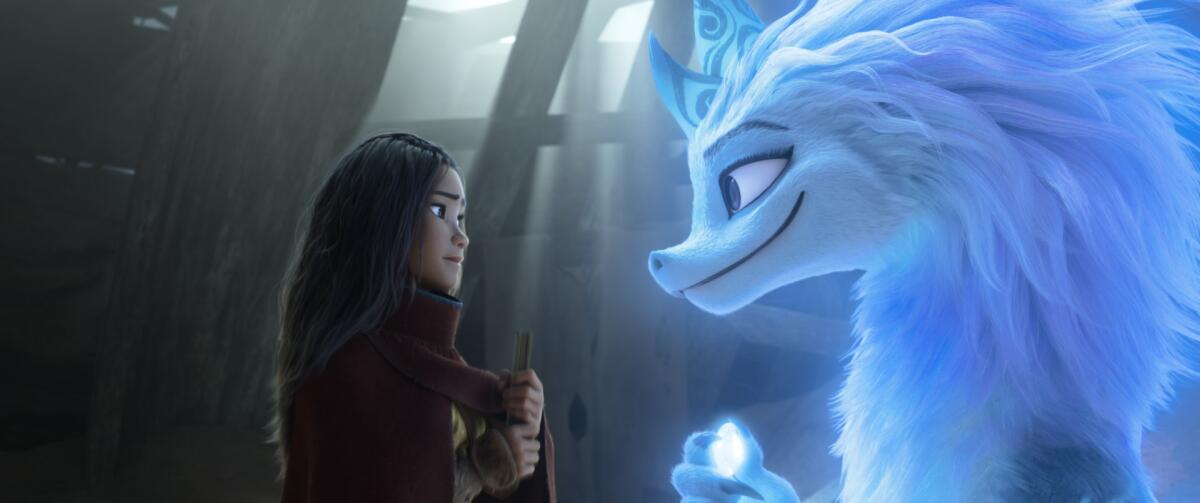
There are dragons and monsters and authentic Southeast Asian cultural elements, but for the filmmakers of “Raya and the Last Dragon,” the key ingredient has always been trust.
“It all centers on the dragons and the dragon gem, which was a great visual embodiment of trust,” says co-director Don Hall of the mystical item whose shattering leads to global disaster and sets off the heroine’s quest to restore it. For that, Raya (voiced by Kelly Marie Tran) needs the help of the last surviving dragon, Sisu (Awkwafina). Once the production landed on trust and reunification as the key themes, the pieces fell into place.
“That day became like our before and after,” says co-director Carlos López Estrada. “That’s how we pitched it to all our collaborators: ‘This is a movie about trust.’ Every decision we make is going to support this idea.”
“What you don’t get to see is how the theme of trust is imbued in how we made the film,” says co-writer Qui Nguyen. “It happened during the pandemic, so everyone was working from home. Usually, we’re in the same room; you can micromanage everything. Here, you really had to trust the storyboard artists, the animators, the lighting artists, which we found strengthened them exponentially. They came back with some of the best work I’ve seen from the studio.”
That work led to something that stunned even Nguyen.
He says, “For Halloween, I wore a Shang-Chi costume and I saw little Rayas running around. It stopped me dead in my tracks. I was part of a pop-culture moment where there were Asian superheroes in this world. There were little girls running around who were Raya. My kid said, ‘Dad, you did this.’ ‘Don’t make me cry!’
“I don’t have to put on someone else’s skin as well as their costume to be a superhero, and kids get to have that … that’s the best reward I could possibly have.”
Belle
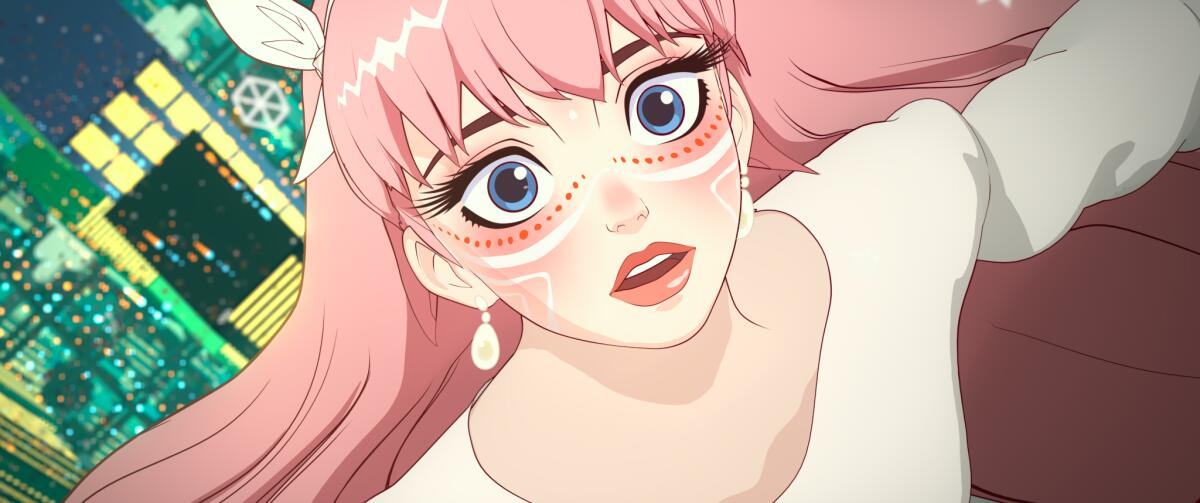
”Belle” is “Beauty and the Beast” in the virtual age, with commentary on papering over insecurities IRL with online avatars as a shy girl becomes a singing cyber-star. It’s full of the wildly imaginative visuals expected from a top anime director (Oscar-nominated Mamoru Hosoda). It’s also a musical, enlivened by songs that would fit on any J-pop station. And it veers into a serious drama about child abuse.
What?
There’s a method to the rainbow-colored madness. Hosoda says that hard turn is an expression of something he detected in the 18th century original version of the tale.
“If you look at the undertones in the story, it’s a very male-dominated society in which ideas of beauty are very restricted. That perception could be a form of violence that lurks just below the surface,” he said through a translator.
“In the movie, it’s a much more literal depiction of violence, but there’s this idea that it’s hidden just beneath the surface.”
He says the two sides of the Beast are clear even in the original, but “Beauty is very one-dimensional — [just] this visually perceived beauty. Today, beauty is something that is self-defined and how we think about it is important.
“So in the same way that the Beast has this duality, the Beauty should also have this duality. And one of the ways that’s expressed is strength. I think the strength that she finds is quite beautiful.”
More to Read
From the Oscars to the Emmys.
Get the Envelope newsletter for exclusive awards season coverage, behind-the-scenes stories from the Envelope podcast and columnist Glenn Whipp’s must-read analysis.
You may occasionally receive promotional content from the Los Angeles Times.

